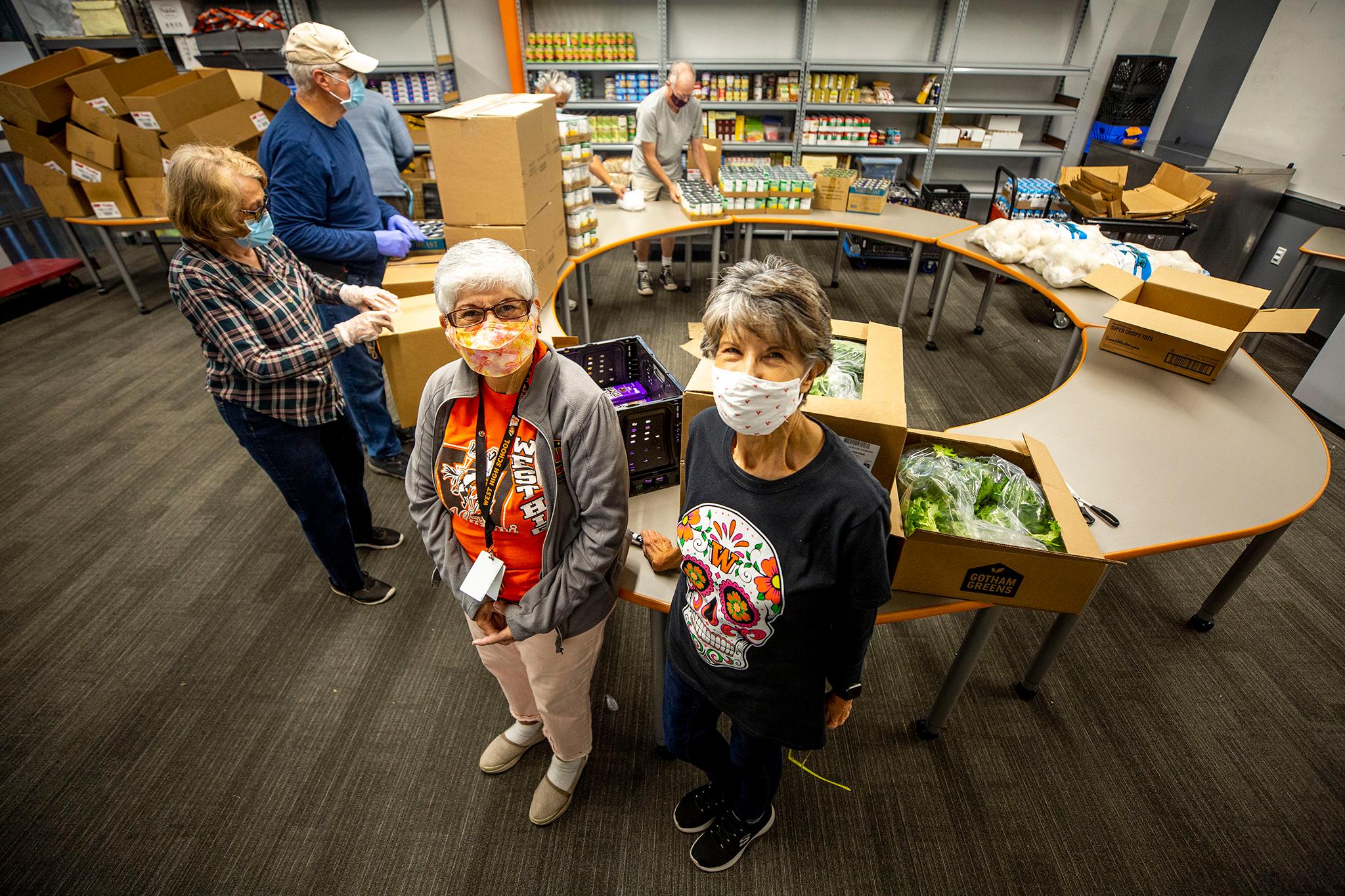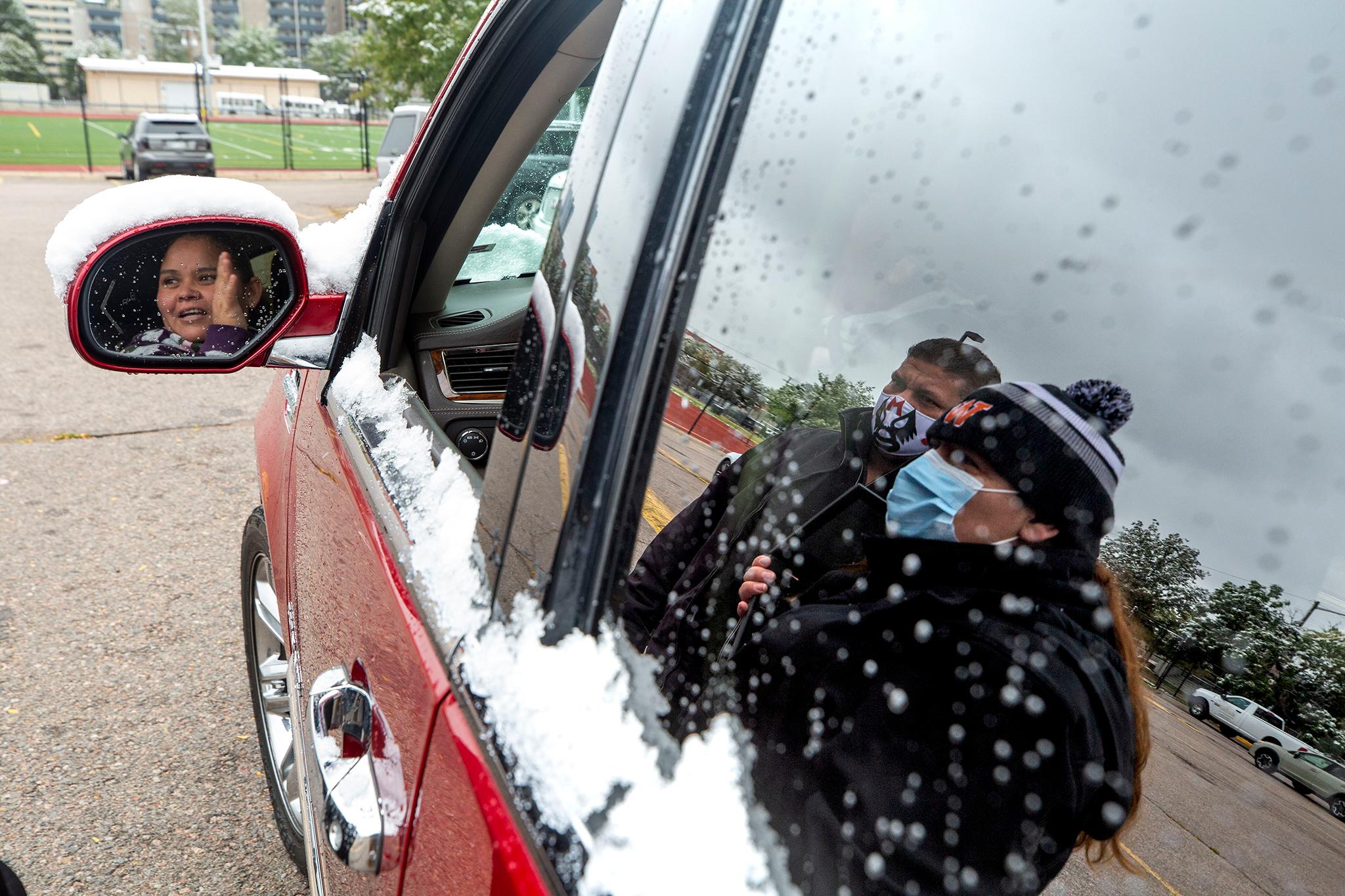The bright green bags are easy to spot. They're filled with bread, eggs, apples, chicken breasts and other free food. And they're going to families that find themselves facing some tough financial decisions.
"It helps us save money so we can afford rent," Ana Olivaria said Wednesday, as volunteers loaded four bags into her SUV for her family and three others.
The Denver Department of Public Health & Environment estimates the pandemic's impact on the economy has doubled the portion of the city's population that's struggling with hunger to 22 percent. Across Denver, schools are stepping in to help families such as Olivaria's. She has three children who attend the same school where she picked up the aid. The volunteers included staff at the campus that's shared by West Early College and West Leadership Academy who had worked with the anti-hunger agency Metro Caring to set up the drive-through food pantry in the parking lot outside the library.
Denver Public Schools closed its buildings on March 18 because of the coronavirus and did not return to in-person learning before summer vacation started. The schools on the West campus and others across the district started the fall session with online learning. Even without students there, free food is still being distributed at schools.
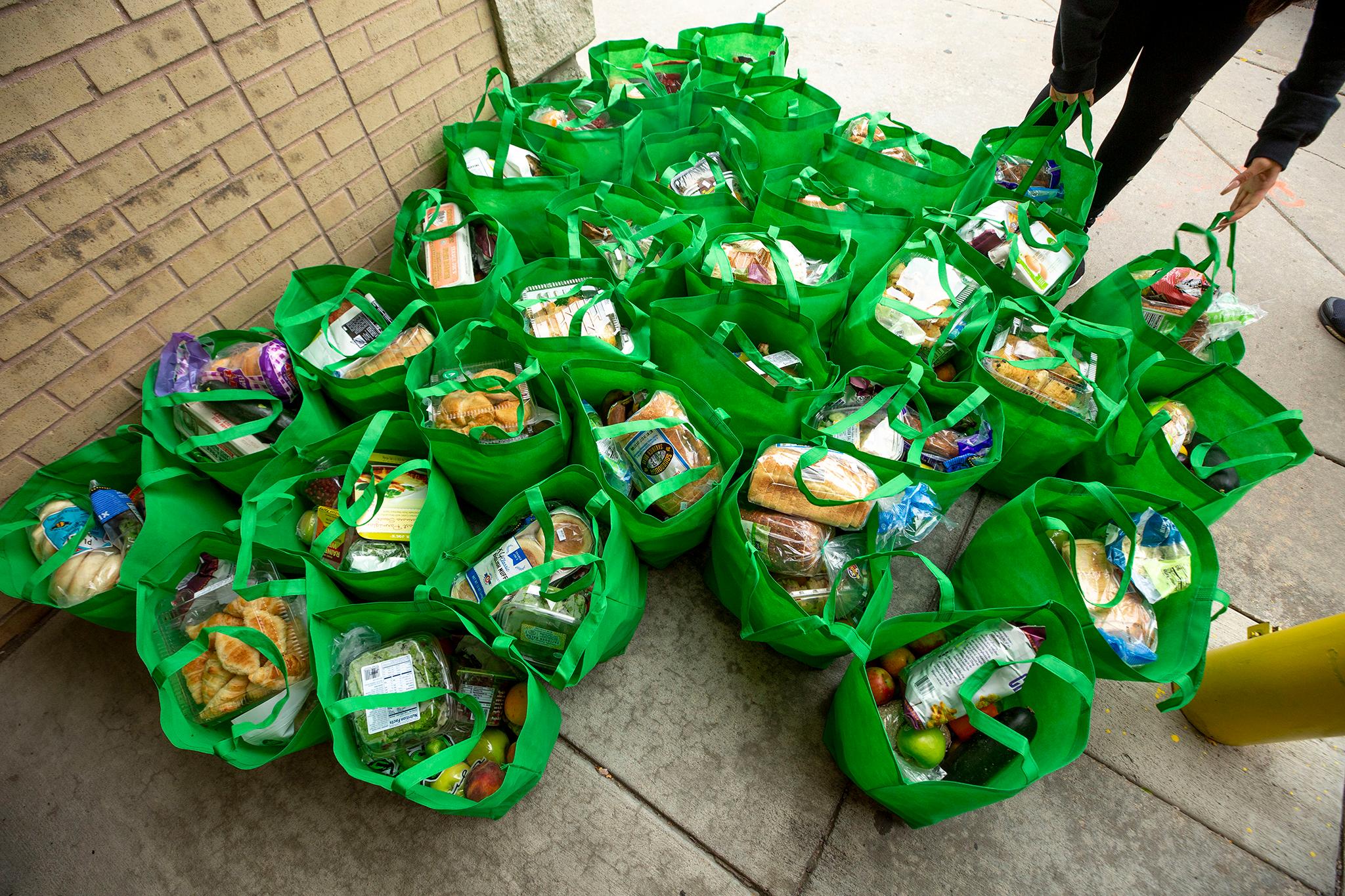
The district started handing out grab-and-go meals in the spring, initially at a dozen schools chosen because they had a high percentage of students whose families' low incomes made them eligible for free and reduced-priced meals under a federal program. About two-thirds of the district's 92,000 students qualify for free or reduced-priced lunches.
Gradually, more grab-and-go sites were added and buses started delivering meals to some Denver Housing Authority complexes and other apartments. Theresa Hafner, director of the district's nutrition services, said the fall term began with 87 grab-and-go school sites as well as a dozen apartment complexes on the school bus meal route.
When the coronavirus shut down schools across the country, the U.S. Department of Agriculture issued emergency authorization allowing districts to distribute subsidized meals to anyone 19 years old or younger. As the start of the fall term approached, the USDA had said schools would have to return to serving meals only to students enrolled in their district and have to charge students who did not qualify for the free and reduced-priced program. Hafner joined school nutrition program administrators across the country in lobbying the federal government to continue the broader rules that allow schools to feed more students.
Late last month, the USDA changed course and said it would allow schools to provide free breakfasts and lunches to any child or teenager through the end of this year, as long as funding lasts. Denver Public Schools announced soon after that it would provide free breakfasts and lunches to all those 18 years old and younger through year's end. Denver is also allowing adults to buy breakfast for $3.00 and lunch for $4.50 at the pick-up and drop-off sites. Earlier in the pandemic, the district had been able to offer free meals to adults thanks to funds from the Denver Public Schools Foundation, a nonprofit that supports the district.
"I wish we could continue to provide meals for everyone," Hafner said. "It's the child hunger that I'm most concerned about."
The West campus is not a Denver Public Schools meal drop-off site. Mia Martinez Lopez, the principal at West Early College, said she did not feel the district's meal pick-up or drop-off sites were close enough for her families.
Among the 1,300 or so middle and high school students enrolled at West campus schools are children with family members who have been sickened or killed by COVID-19, Martinez Lopez said. Some breadwinners have lost wages because they have had to stay home in quarantine. Drastic cuts made to Regional Transportation District services because of the pandemic have made it difficult for families without cars to get to grocery stores and food pantries.
Food insecurity was a problem at West even before the pandemic. Ana Arteaga, a parent liaison officer for Martinez Lopez, once regularly used a school bus to take families to the Metro Caring food pantry in City Park West. A teacher set up a pantry at West in late 2018 after learning about a pantry at South High School. Members of the West High School Alumni Association helped the teacher run the pantry. Eventually, alums led by Rita Cordova, who graduated in 1963 and later worked as the school's secretary for 15 years before retiring, took over the pantry. Cordova is now the alumni association's historian.
Retired teacher Bernie Lopez, the alumni association's president, said the group's activities had included raising money for scholarships for students. He described the food pantry as another way to pay it forward.
"I can never, ever repay what the school did for me," said Lopez, who graduated from West High in 1967. He went to the University of Northern Colorado and returned to West High in 1971 to teach shop and coach basketball, baseball, football, soccer, volleyball and wrestling.
Lopez, whose mother was a migrant worker who left high school after her junior year, said he would not have considered going to college without the support and encouragement he got from his teachers at West. His son, a mechanical engineer, and his daughter, a lawyer, "knew they were going to go to college from a small, small age because they saw what their parents had achieved," Lopez said.
Now students can leave West Early College with both high school diplomas and associate degrees thanks to concurrent enrollment partnerships with the Community College of Denver, Metropolitan State University of Denver, the University of Colorado Denver and Western Colorado University. Apprenticeships at Denver Health Medical Center and elsewhere ensure students also leave with work experience.
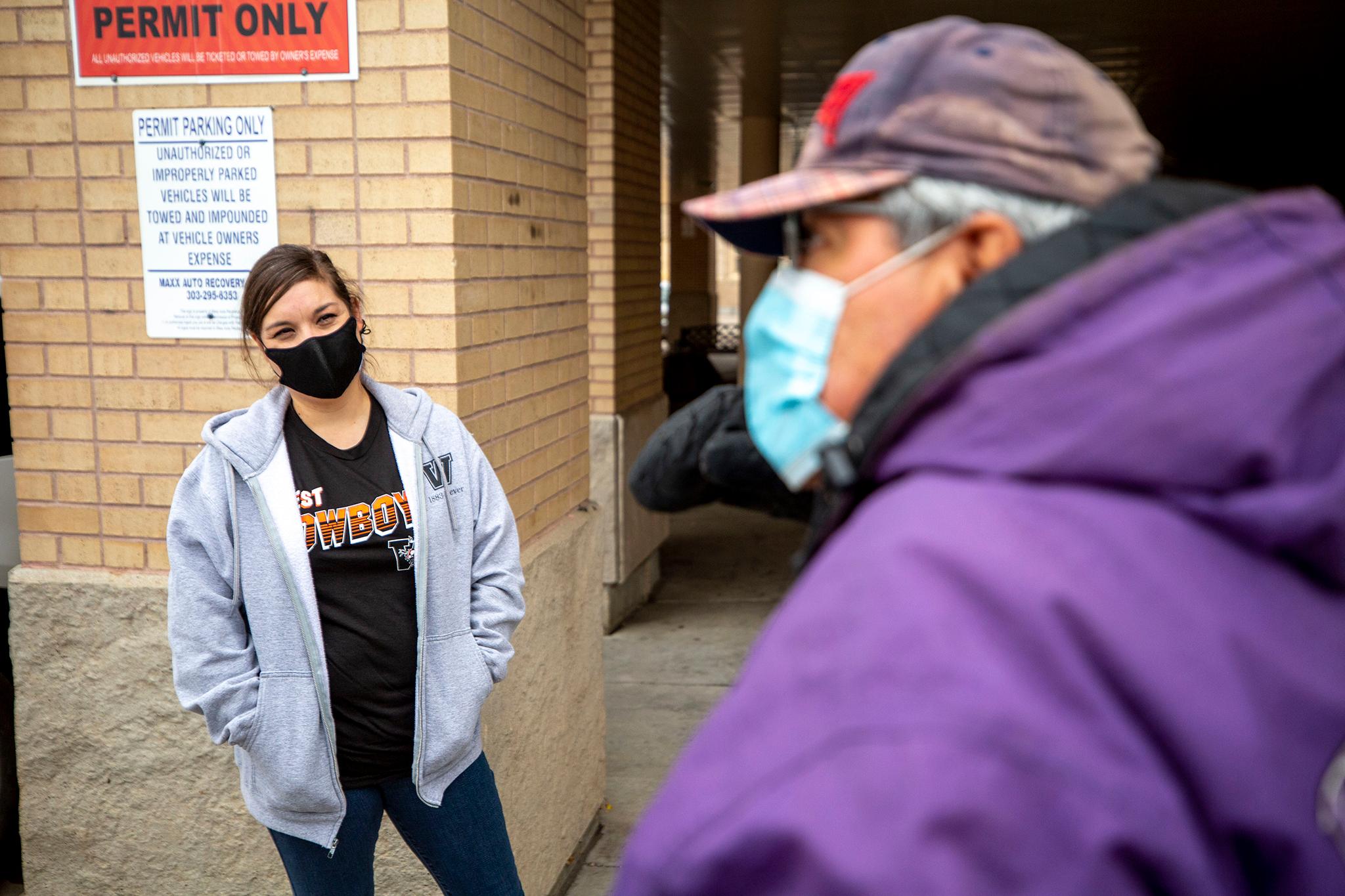
Three nonprofits, We Don't Waste, Food For Thought and the Food Bank of the Rockies, support the alumni-run pantry. The pantry ensured that West students went home on Fridays knowing they could eat over the weekend. The pantry shut down when the pandemic closed the school. Arteaga, the West Early College parent liaison officer, worked to fill the gap over the spring and summer by turning to Metro Caring and arranging distributions every Wednesday. She started with 15 to 20 boxes and bags a week, and she's now up to 50.
Arteaga described fighting hunger among West students as a collaborative project. Parents with vehicles, such as Olivaria, collect food for their families and others. School staff and volunteers keep the operation going on site.
"Whatever works to make sure that food gets to our kids," Arteaga said.
Principal Martinez Lopez said that sometimes families who have signed up to receive food can't make it on a distribution Wednesday. So Arteaga will follow up with phone calls to families on the list and others who might need food.
"We get nervous when there are bags left over. It's like, 'Who can we get it to?'" Martinez Lopez said, adding that despite the pantries and other efforts, she was concerned about not reaching some families in need.
The alumni have prepared to resume their pantry Saturday and planned to offer food weekly to West students and their families through the end of the school year. In addition to food, volunteers at the pantry will distribute information about signing up for extra food stamps benefits available to low-income families as part of the government's response to COVID-19.
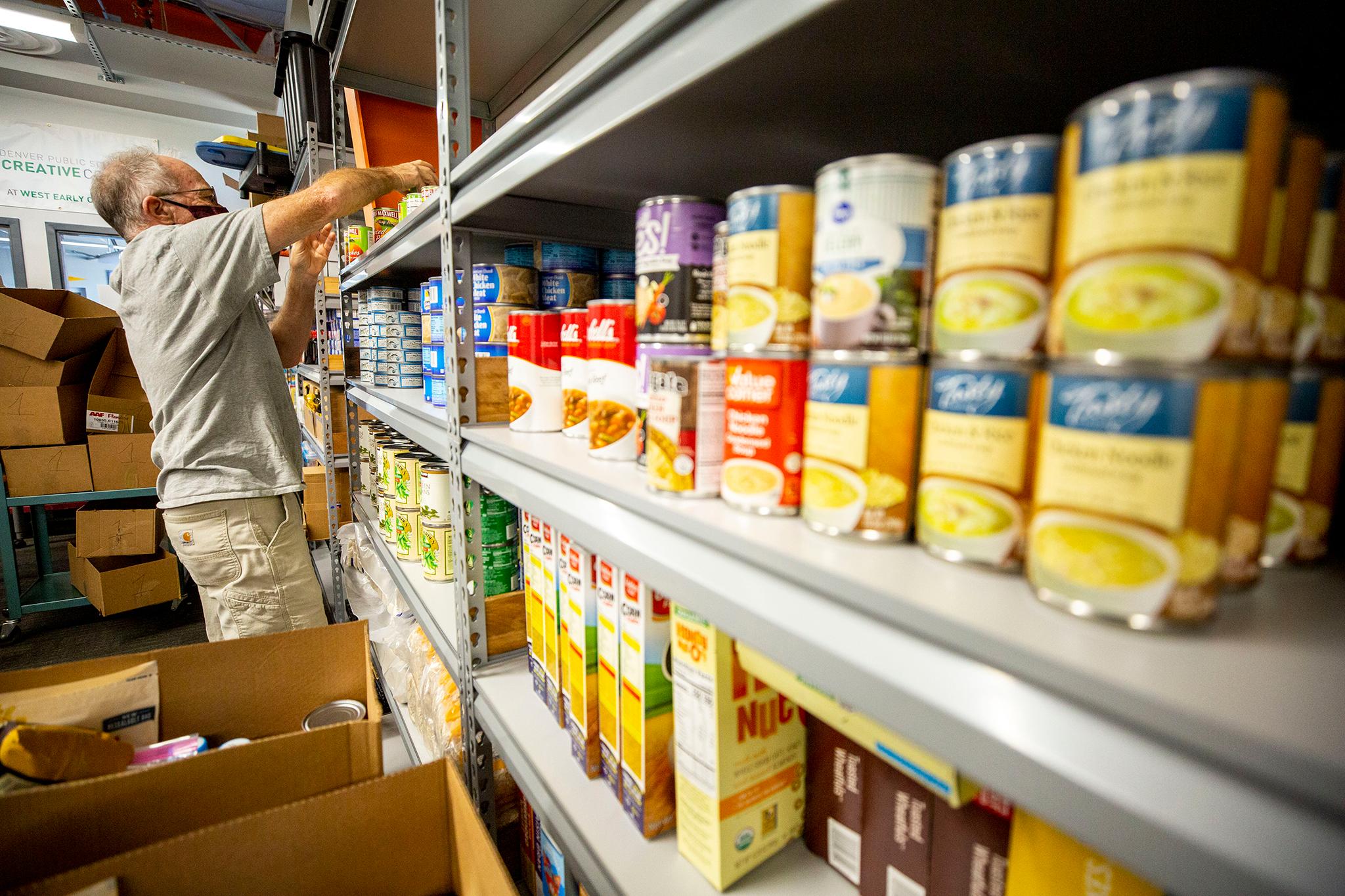
The arrangement that Arteaga made with Metro Caring is expected to end in mid-October. Until then, West will have two weekly food distributions.
Irene Martinez Jordan, a retired West principal who volunteers at the alumni pantry, wrote a proposal that helped the pantry get a $248,577 grant last month from the Denver Department of Public Health & Environment's Healthy Food for Denver's Kids Commission. It was part of the first allocation of funds in a program made possible when Denver voters last year approved a .08 percent sales tax to raise money to fight childhood hunger and food insecurity in Denver.
Eight DPS schools or affiliates have received Healthy Food for Denver's Kids grants. Other DPS recipients included the South food pantry, which got $181,850.
Cordova and Martinez Jordan said they will use some of the grant money to buy more fresh food and Hispanic items that will be familiar to families with students at West. They also bought two large refrigerator-freezers with grant money.
Cordova and Martinez Jordan, who worked at West together from 1997 to 2001, are so close that they often finish each other's sentences.
"Rita was my boss when I was the principal," said Martinez Jordan, who retired soon after Cordova did in 2001. "And she's my boss, still."
Cordova said more than 200 students got food at the pantry every week during the last school year. She expects the need will be greater this year, noting that many West parents have likely lost their jobs at restaurants and hotels and as cleaners because of the recession prompted by the coronavirus.
"This community is going to be hit harder than a lot of communities," Martinez Jordan added.
